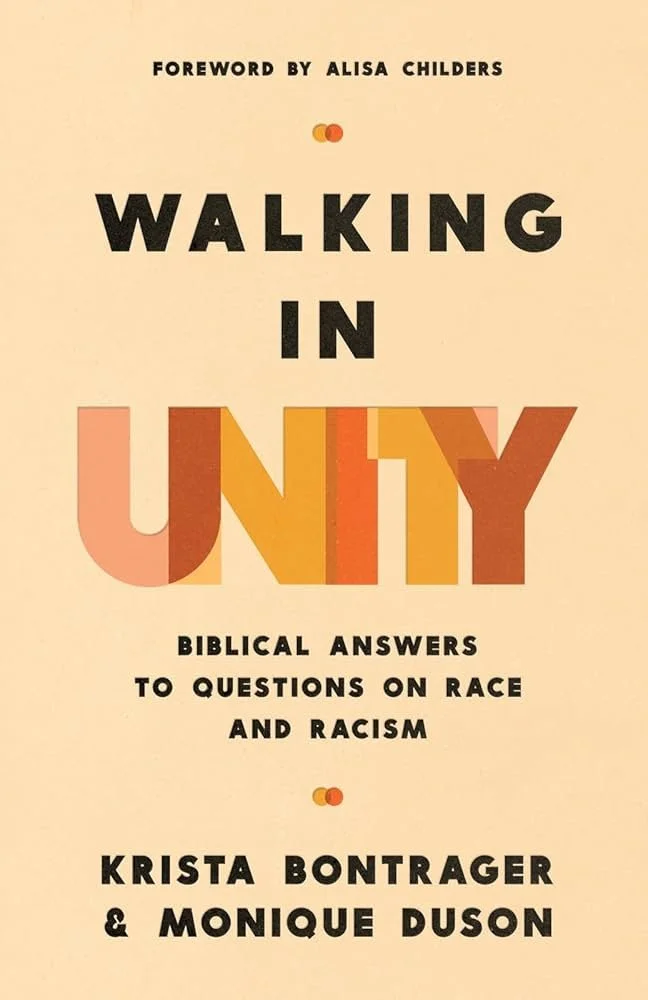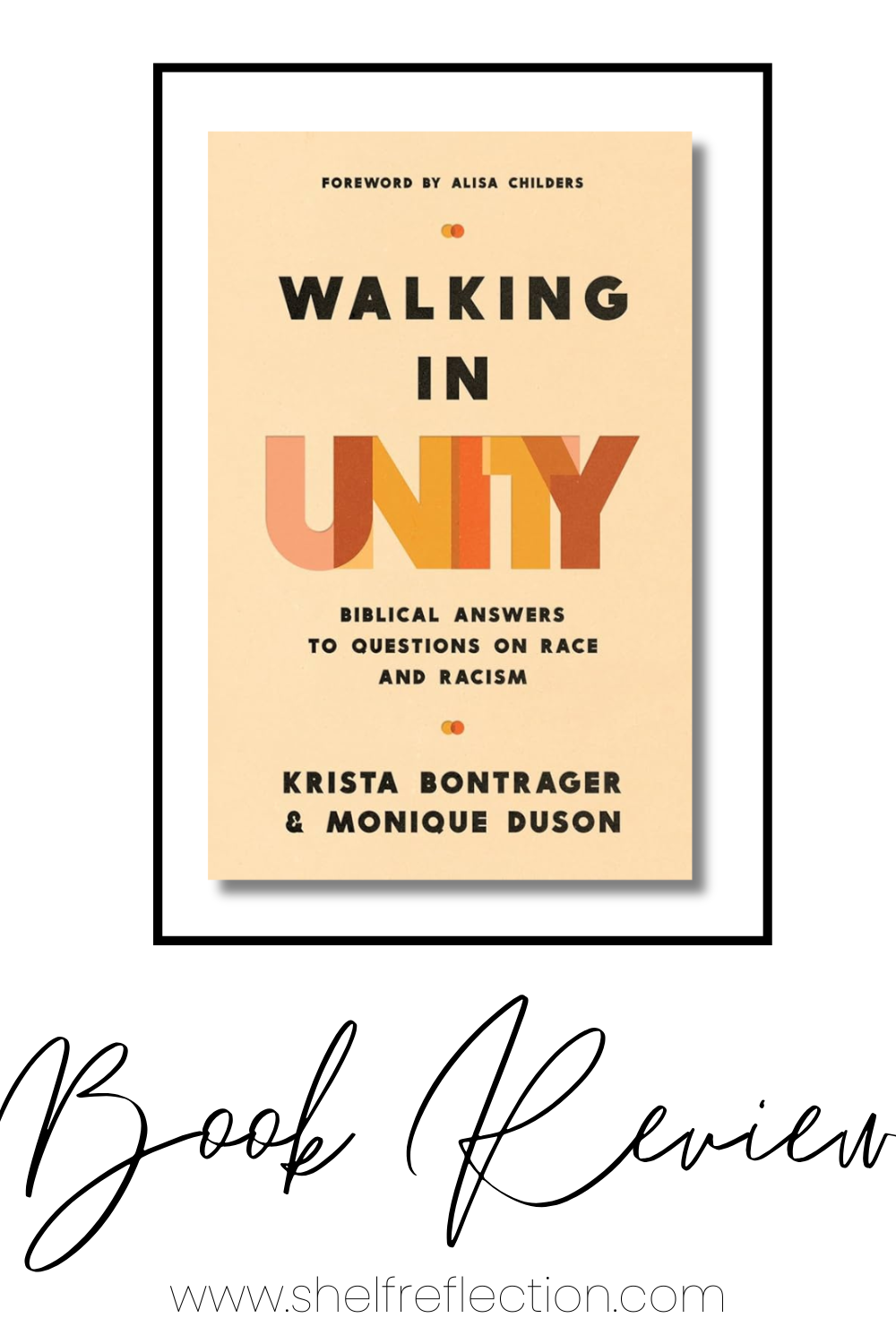Walking in Unity
Walking in Unity: Biblical Answers to Questions on Race and Racism
By: Krista Bontrager & Monique Duson
“For believers, unity is our starting point, not a destination to be achieved.”
“Regardless of one’s political or ideological affiliation, culture will always fail to bring about true unity. Any culture that is not rooted in Christ can only foster more division.”
I heard Duson & Bontrager discussing their book on a podcast, and I went and bought the book because I wanted to hear more. I’ve done a lot of reading on the topic of race since 2019 and am interested in how people have actually lived out what the authors call ‘biblical unity’ with people of other ethnicities.
What I loved most about this book was that it was written by friends— one white, one black— who had to wrestle through all the questions because they valued their relationship. They are both followers of Christ, yet were approaching these issues with very different viewpoints. They had to look at what the Bible said and see where each of them needed to adjust their framework and understanding.
The title is perfect because they had all of these conversations while they were literally on walks together. The Bible uses this type of terminology regularly in regards to our faith journey— walking with the Spirit, running a race, etc— and so we understand that it’s an ongoing process. It’s not one day, one action, or one decision that accomplishes unity. It’s a daily, active walk.
Alisa Childers offers a great summary of the book in her foreword:
“Duson and Bontrager have risen above the noise to provide the body of Christ with a practical resource that doesn’t just teach ideas and concepts. It lifts the lid off their own personal journey of friendship and invites the reader to join them as they wrestle through inflammatory topics like racial reconciliation, systemic injustice, the multiethnic church, corporate repentance, and reparations. Their story serves as a beautiful example of two sisters in Christ realizing that this identity is more important than any other.”
There are a lot of good books on this topic and a lot of unhelpful ones. What makes this one helpful are the real life examples of their conversations. They share their conversations, sometimes verbatim, in a transparent and honest way, showing how each of them responded strongly at different things.
As someone who is white, I related with a lot of the struggles and frustrations Krista had with wanting to care about her friend’s lived experience without allowing it to dictate what is true or right. I’m sure there will be a lot of readers who identify more with Monique trying to explain to Krista how racism is not a thing of the past.
But whether you relate more with one author than another, they carry you along on their journey to find unity and common ground. You will see that our shared identity in Christ is far more important than our racial identity.
One major thing the authors tackle is the concept of ‘racial reconciliation.’ This is basically the ‘Christian’ term of trying to repair race relations.
I hear this phrase a lot, and I’m sure you do too. It sounds right. It sounds biblical. Reconciliation is definitely a biblical term.
In their second chapter they look at the Racial Reconciliation Model and then contrast it with what they’ve deemed the Model for Biblical Unity. This biblical model is what has been the basis for The Center for Biblical Unity they co-founded where they try “to create a place where injured travelers of all ethnicities can find a safe space to discuss race, justice, and unity according to the rules of Scripture.”
Heavily summarized, they describe the general principles most racial reconciliation advocates agree on:
the problem behind racial division are the “large-scale systems of oppression created by white people to hold back people of color” that have continuing effects that “perpetuate racial injustice”
the solution is to “do the work of antiracism” and pursue equity via wealth distribution and reparations and repent of whiteness and the colonization of Christianity
racial reconciliation can only be achieved “when all racial groups reach a shared agreement about historic injustices and required remedies” and work is done to elevate the voices of the marginalized
“As I (Monique) have read widely… I’ve come to believe that, in most cases, racial reconciliation is antiracism with a few scriptures layered on top.”
If you are unfamiliar with antiracism, it is what is promoted by Ibram X. Kendi and Robin DiAngelo, and then within Christian circles by Jemar Tisby (The Color of Compromise) and Latasha Morrison (Be the Bridge).
They spend time explaining the flaws they see with this racial reconciliation model in more detail but basically:
“It fails to interpret key biblical texts accurately, takes the wrong starting point, and heaps undue burdens onto the shoulders of all Christians to ‘do the work’ that only Christ can do.”
They follow up with a description of the biblical model. The biblical model is a framework based on four principles:
Creation Identity (being created in the image of God as male and female, deriving our dignity and worth through him; also part of this identity is our sin nature and how it affects the world)
Salvation Identity (through the work of Christ on the cross, we now have a path of reconciliation by joining God’s family where we find unity)
Matters of Providence (secondary things like the circumstances surrounding our birth and life that are governed by God’s sovereignty and providence)
Walking in Unity (unity based on grace, not works)
“This framework gives someone like our friend Ryan Bomberger, who was conceived in rape (a matter of providence), inherent dignity from the moment of conception (creation identity) and the opportunity for a new identity as a child of God (salvation identity).”
Throughout the rest of the book they apply these principles to concepts like intersectionality, colorblindness, definitions of racism, intention and impact, microaggressions, systemic injustice, reparations and redistribution, representation, multiethnic churches, and multiethnic families.
I thought Duson & Bontrager did a good job of defining terms and identifying complexities within these issues, not just rejecting anything wholesale but looking at individual situations to see what is at play.
Antiracism says that racism never goes away and it is present in every interaction, but the authors show the dangers of using this lens.
“Media, social systems, peers, and institutions regularly categorize us according to our skin color and thereby label us as ‘privileged’ or ‘powerless.’ Constant reinforcement of these categories can keep us divided, like parallel lines that never intersect.”
“Our ethnic division, at its foundation, is rooted in the sin and division of humankind’s first family. Racial division is a byproduct of sin, and that sin starts in the broken hearts and bent nature of human beings.”
Therefore,
“The ministry of reconciliation that Christians are called to entails proclaiming the good news that the Messiah has come, and inviting people from every nation to come be a part of His new community… Whatever cultural or social identity we may have as a matter of God’s providence, including our ethnicity, socioeconomic status, or sex, must take a back seat to our salvation identity.”
Their chapters on multiethnic churches gave me some things to think about; I hadn’t really thought about the history behind black churches.
I’ve also wondered how we do multiethnic churches if people have different preferences on worship music.
They make good points about how the Church is already multiethnic and how the primary goal of the church is spreading the gospel, not achieving the ideal demographic makeup. Yet, at the same time, they ask churches to look at the communities they are located in and identify how they can serve and reach the people groups they are already living around.
I especially enjoyed their chapter ‘How Do We Talk about Race’ where they provide nine principles for healthy interactions with others about race. They were convicting and helpful and, if applied, will definitely change the landscape of these conversations.
The authors did an honest and careful job looking at historical and present-day realities. I felt like they did a great job acknowledging the experiences of various sides of the issues and showing how all of us can grow in our understanding and interactions on this topic.
Unlike a lot of books on race, this one offered so much hope, encouragement, and tangible help to readers. The ultimate truth that is so often missed or understated is that when we misidentify the root of the (real) problem we misidentify the deeper solutions to that problem.
“The beauty of Christianity, in contrast to secular worldviews, is that it offers a better hope for healing, justice, and unity. Where culture encourages contention and resentment, the gospel brings peace. The world says that reconciliation comes through favoritism and unity comes through striving. Christianity says reconciliation comes through Christ, not our works, and that striving ceases at the foot of the cross. This is good news for everyone, of every ethnicity and skin tone! It is Jesus who restores all things and makes us one family. He is the foundation of our unity.”
Recommendation
This is definitely a book I would recommend. Especially if your thoughts on race or racial reconciliation have been formed by people like Kendi, DiAngelo, Tisby, Morrison, or Eric Mason. This book may not change your mind, but Duson & Bontrager ask some very vital questions about these writers’ works that would be important for you to hear out.
If conversations about race overwhelms you, I think you would find a lot of clarity and peace in this book.
If you’re in the camp of people who wave off conversations about race, not wanting to be overly focused on it, I think you’re still missing out on some essential truths about sin and reconciliation and what it looks like to be part of God’s family. There is still something valuable for you here. Plus it will help you understand your brothers and sisters in Christ who do relate to Monique’s struggles.
If you want to check out more of what Bontrager & Duson have to say, you can peruse these articles on their website or check out this podcast called Off-Code where Monqiue and Kevin Briggins “ignore the cultural codes and have real and intriguing conversations regarding the black community and ways we can move forward to a biblical vision for human flourishing.”
You can browse the many books I’ve read on race HERE, but one other book that has typically been my go-to recommendation is Thaddeus J. William’s book- Confronting Injustice without Compromising Truth.
You can order a copy of this book using my affiliate link below.
Share this book review to your social media!


